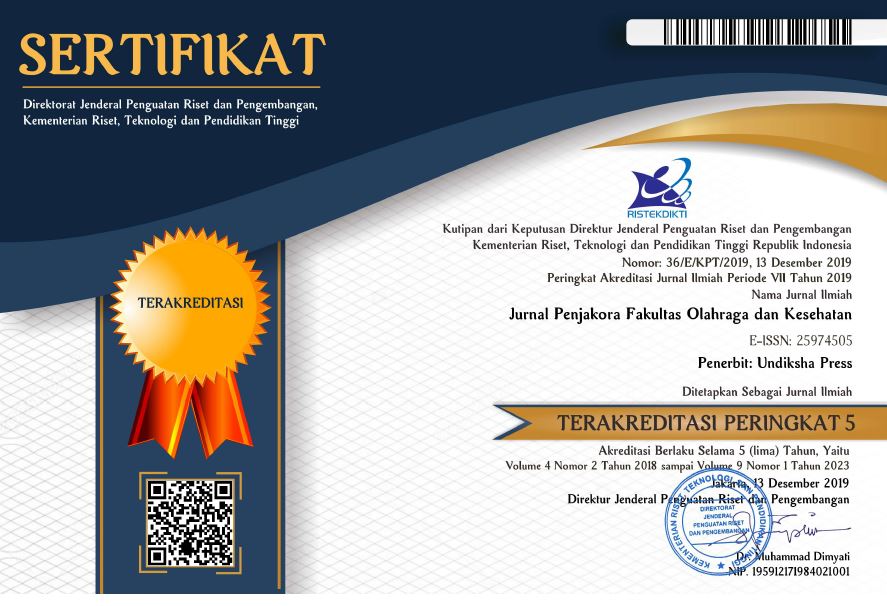Pengaruh Model Pembelajaran Kooperatif Tipe STAD Terhadap Hasil Belajar Teknik Dasar Passing Bola Voli
DOI:
https://doi.org/10.23887/penjakora.v5i1.14477Abstract
Penelitian ini bertujuan untuk mengetahui pengaruh model pembelajaran kooperatif tipe STAD terhadap hasil belajar teknik dasar passing bola voli. Penelitian ini adalah penelitian eksperimen sungguhan dengan menggunakan rancangan penelitian the randomized pretest-postest control group the same subject design. Sampel penelitian adalah siswa kelas VIII A dan VIII D SMP Negeri 3 Sukasada tahun ajaran 2017/2018 berjumlah 57 orang siswa. Penentuan sampel menggunakan simpelrandom Sampling. Data hasil belajar dikumulkan mulai pretest dan postest. Analisis data menggunakan uji-t dengan bantuan SPSS 16.0 for windows. Pada kelompok eksperimen diperoleh nilai rata-rata 0,58. Sedangkan pada kelompok kontrol diperoleh nilai rata-rata 0,27. Berdasarkan uji Independent samples test angka signifikansi yang diperoleh adalah p=0,000˂0,05. Jadi dapat disimpulkan bahwa model pembelajaran kooperatif tipe Student teams achievement divisions (STAD) berpengaruh signifikan terhadap hasil belajar passing bola voli pada siswa kelas VIII SMP Negeri 3 Sukasada tahun pelajaran 2017/2018. Dengan demikian disarankan untuk proses pembelajaran guru dapat menerapkan model pembelajaran kooperatif tipe Student teams achievement divisions (STAD) menjadi salah satu alternatif pembelajaran yang dapat diterapkan pada materi ajar bola besar yaitu passing bola voli.
Kata-kata kunci: pembelajaran kooperatif, STAD, hasil belajar, passing bola voli.
References
I.M.K. 2017. Pengaruh Model Pembelajaran Kooperatif Tipe Student Team Achievement Divisions (Stad) Terhadap Hasil Belajar Passing Bola Voli. https://ejournal.undiksha.ac.id/index.php/JJP/article/view/13072 diakses pada tanggal 30 Juni 2018
Budayasa, I.M.A., Budhiarta, I.M.D., Lestari, N.M.S.D. 2014. Implementasi Pembelajaran Kooperatif STAD untuk Meningkatkan Aktivitas dan Hasil Belajar Teknik Dasar Passing Bola Voli. https://ejournal.undiksha.ac.id/index.php/JJP/article/view/2364/2047 diakses pada tanggal 30 Juni 2018.
Budhiarta, I Made Danu. 2008. Teori Praktik Permainan Bola Volidan Bola Voli Pantai. Singaraja: Universitas Pendidikan Ganesha
Dimiyati dan Mudjiono. 2006. Belajar dan Pembelajaran. Jakarta: Rineka Cipta.
Isnaini,A.F.A., Wahjoedi, Wijaya, M.A. 2017. Pengaruh model pembelajaran kooperatif tipe STAD terhadap hasil belajar passing Bola Basket Pada Siswa Kelas Vii SMP Negeri 3 Sawan Tahun Pelajaran 2017/2018. https://ejournal.undiksha.ac.id/index.php/JJP/article/view/13104 diakses pada tanggal 30 Juni 2017.
Slavin, R.E. 2010. Cooperative Learning. Bandung
Suparta, I.W., Kanca, I.N., Adi, I.P.P. 2014. Penerapan model pembelajaran kooperatif tipe STAD Meningkatkan Aktivitas dan Hasil Belajar Passing Bola Basket. https://ejournal.undiksha.ac.id/index.php/JJP/article/view/2370. diakses pada tanggal 30 Juni 2018.
Trianto.2007.Model-Model Pembelajaran Inovatif Berorientasi Konstruktivisme. Jakarta:Prestasi Pustaka.
Wenawa putra, I Gede 2013 penerapan model pembelajaran kooperatif tipe STAD meningkatkan aktifitas dan hasil belajar teknik dasar passing bola voli.
https://ejournal.undiksha.ac.id/index.php/JJP/article/view/587/472 diakses pada tanggal 30 Juni 2018
Downloads
Published
Issue
Section
License
Authors who publish with the JURNAL PENJAKORA agree to the following terms:
- Authors retain copyright and grant the journal the right of first publication with the work simultaneously licensed under a Creative Commons Attribution License (CC BY-SA 4.0) that allows others to share the work with an acknowledgment of the work's authorship and initial publication in this journal.
- Authors are able to enter into separate, additional contractual arrangements for the non-exclusive distribution of the journal's published version of the work (e.g., post it to an institutional repository or publish it in a book), with an acknowledgment of its initial publication in this journal.
- Authors are permitted and encouraged to post their work online (e.g., in institutional repositories or on their website) prior to and during the submission process, as it can lead to productive exchanges, as well as earlier and greater citation of published work. (See The Effect of Open Access)







